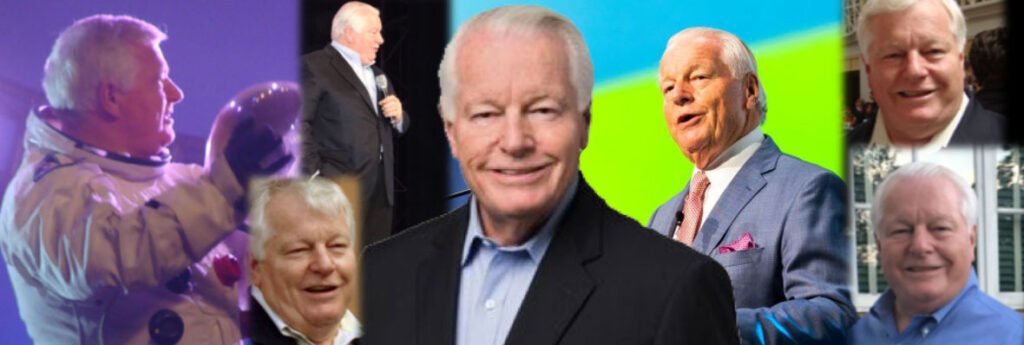The face of the travel in the US, Roger Dow, has announced he will be stepping down from his role as president and CEO of the US Travel Association after 17 years at the organization, although not until he completes an extension of his current mandate for one last year until July 2022. No matter who succeeds him, he will be missed.
Equally comfortable consorting with presidents or members of the travel trade, and as recognizable on stage – and there have been many – as on the tradeshow floor, or in the bar afterwards, Dow has led the organization with an easy, enthusiastic, and always optimistic touch, even as the industry coped with incidents of terrorism, weather bombs, recession/depressions, and plagues, most notably the current coronavirus calamity.
Through it all, Dow, who “retired” from Marriott in 2004 to take the USTA post starting in January 2005, guided US Travel and the broader industry through periods of remarkable growth – marked by 10 consecutive years of expansion from 2009 to 2019. He is credited with leading the legislation that created Brand USA, the nation’s destination marketing organization, and developing policies and programs that enabled domestic and international inbound travel to thrive by ensuring an understanding of travel and tourism as a linchpin of the American economy.
He has also served as the face of the industry to the international media at such events as the annual IPW travel trade show, where he typically absorbed withering criticism on US policy (not of his making) and the country in general, ranging from unwieldy visa waiver issues to customs commotions and obstacles, to, of course, Donald Trump.
Displaying one of his greatest talents, Dow never dodged such issues, or “spun” them with dubious defenses, as many in his position do. Rather he dealt with them with a deftness that addressed reality, but enough caution not to anger political masters who had the ability to make things much more difficult for an always seemingly beleaguered travel industry (or presumably himself).
For example, in 2018, while Trump administration policies were making it harder for visitors to enter the US under the guise of trying to keep out “terrorists, not tourists,” I suggested to Dow that it was really the country’s horrific daily gun violence (including fresh memories of the worst mass shooting in modern US history at a music festival in Las Vegas in which 58 people killed) that were scaring away visitors and contributing to a loss of market share, not a fear of international terrorists roaming American streets.
He matter-of-factly replied: “When it comes to guns… and you see the horrific things that have happened, with huge media coverage – as they should – these incidents concern us greatly. What happened in Las Vegas concerns us greatly. That said, our whole mission is to increase travel to and within the United States. There’s a lot of dialogue going on… but that’s outside our lane; I’ll just say that we must have a secure place, but not just secure at the airports or getting on a plane, but secure wherever you travel.”
The answer was subtle, but open to interpretation, and, as such, not provocative towards a famously thin-skinned and vengeful president; and it was certainly not an answer a journalist would expect to get on the record in front of dozens of international colleagues anxiously poised over their Tweet buttons.
At the same time, Dow has always been quick to suggest that all the administrations he worked under required “educating” as to the overwhelming economic benefits and job creation provided by the travel and tourism industry – including, and in its early days most especially, the Obama regime, which ultimately became one of travel’s best supporters.
I once listened to an absorbing script-free address Dow delivered to members of the Asia Pacific Travel Association (PATA) at an off-site event at World Travel Market in London about the long and winding road to the launch of Brand USA; for those lucky enough to be there, it was a masterclass in determination and political logistics and revealed a side of the USTA CEO perhaps unknown to most.
With the news of his impending departure – he has said he is not “retiring” and plans to stay close to the travel industry – US Travel national chair Christine Duffy, (president of Carnival Cruise Line), praised Dow’s enduring commitment, steadfast leadership, and “profound influence on this industry and for strengthening US Travel as a key resource and unifying voice.”
Profound influence, indeed.
And Duffy added, “We are especially glad that Roger will remain in this critically important role over the next year as we continue to rebuild and chart the future course of US Travel and the industry.”
What she means is there are few better suited to leading the US out of a pandemic that is still raging – a time that is, after all, hardly a time for transition, especially if means saying farewell to an executive who has “seen it all” during his many decades in the business – though he has also admitted that he has never seen anything like this.
Dow says he is committed for the next year to “working with the board and our talented team to continue leading our recovery,” and also ensuring that the organization he is leaving “is on a firm trajectory for its next CEO.”
And when the time finally comes, we will say “Fare well, Roger!” and mean it – not because we hardly knew ye, but because we knew ye well.

